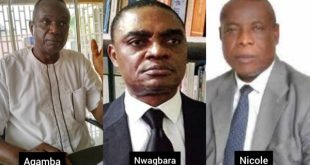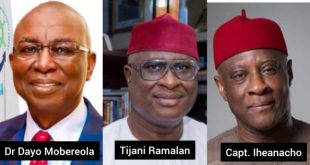By Babajide Okeowo

There is a saying that a House divided against itself cannot stand. This above phrase aptly describes the scenario playing out in the maritime sector.

This was succinctly put by the Executive Secretary of the Nigerian Shippers’ Council Hon Emmanuel Jime at the Appreciation Dinner organized by the League of Maritime Editors for the former Ministers of Transportation, Mu’azu Jaji Sambo and former Minister of State for Transportation, Prince Ademola Adegoroye when he disclosed that inter-agency rivalry almost scuttled the implementation of the Cargo Tracking Note (CTN).
“You know I don’t want to stand here and lie to us; you see there is inter-agency rivalry among us, I know quite a lot of our friends that didn’t actually really want the idea of NSC implementing the CTN

“When Muazu Sambo came first thing he did as soon as he interacted with me was that he said ‘ES the NSC under my watch will be given the implementation of the CTN and he went ahead and did everything using the political and capital available to make sure that the Federal Executive Council (FEC) approved the CTN for NSC; not only did he get the approval he ensured that NSC was given the right of implementation’”, he told the gathering.
This rivalry has been described by many as the bane of trade facilitation in Nigeria and a reason why the drive by Nigeria to become a maritime hub will remain a dream.
For Dr. Emeka Akabogu, Maritime industry expert and Lawyer, overlapping statutory mandates, vaunting territorial appropriation and suboptimal ministerial supervision are to be blamed for these inter-agencies rivalries.
Akabogu, the Senior Partner at Akabogu & Associates in a chat with MMS Plus disclosed that the laws setting up these agencies failed to clearly spell out the boundaries of operations.
“Some laws fail to clearly delineate limits between mandates of these respective agencies. This is evident in mandates for wreck removal and marine waste management between the Nigerian Maritime Administration and Safety Agency, (NIMASA) and the Nigerian Ports Authority (NPA) in their respective laws for instance, or issues relating to the regulation of certain aspects of ports and port services between NPA and Nigerian Shippers Council on the other hand” he started.
Toeing the same line, Hassan Bello, the immediate Executive Secretary of the NSC told this reporter that this rivalry was inevitable because, in the legal framework or legal instrument that set up these agencies, there were many duplications of functions that inevitably will bring conflicts.
“I will attribute this to the legal framework or legal instrument that set up these agencies They were not clear, as there were many duplications of functions, so, that inevitably will bring conflicts.
“The issue of port economics regulation was not well pronounced. A distinction must be made between technical and economic regulation” he posited
Continuing, Akabogu disclosed that this unhealthy rivalry between the government agencies has had a huge impact on the country’s drive to be a maritime hub.
“It (inter-agencies rivalries) reduces efficiency, which increases costs and makes the industry as a whole uncompetitive. It also constrains motivation and innovation. These issues collectively work against factors necessary for a maritime hub, which are the availability of competitive services, credibility of operations, and certainty of outcomes,” he added.
Bello agrees completely. He disclosed that the efficiency of ports in neighbouring African countries where, as an importer you are only required to sign documents at two agencies to get your cargo out of the port as compared to Nigeria where you have to go through as many as 7 or more agencies to sign the same document will always hamper trade facilitation and deny Nigeria the maritime hub it desperately desires.
“I see competition from other countries and ports as the reasons why we have not obtained a hub status. There are some ports in the West African sub-region that are more efficient than we are.
The decision to become a hub will depend on our services, and ability to attract shippers to your ports. It is important to know what your competitors are doing. If in a port in a neighboring country, you sign 2 documents and it takes you three days to clear your cargo and in Lagos, you sign 17 documents and it takes 21 days to clear your cargo, which port will you go for? He rhetorically asked.
Evangelist Leonard Ogamba, President of the Shippers’ Association Lagos State blames those saddled with the policy drafting of these agencies and those running the agencies as the reason Nigeria might find it difficult to attain a hub status.
He lamented that the moment you start using politicians who have no idea about how the business climate operates to head these critical agencies, it is a recipe for disaster.
“Do you know that it is shorter for cargo to come from Dubai to Nigeria than for anybody to take his cargo from Apapa or Tincan Island Ports to anywhere in Lagos State? It is as bad as that! So, we still have a long journey to go to attain a hub status.
“One of the reasons for this is that those people that are making these policies, those people in the position to take decisions do not understand the dynamics of the business environment, some of them are not even businessmen, they don’t even understand.
“But they act on what their directors and special advisers tell them. But the moment you start making use of politicians to head these critical sectors, what do you expect?
“When you look at these agencies, who are the people running the agencies? For instance, if a career officer is a Comptroller-General of the Nigeria Customs Service, don’t you think that he would have given quality advice to the Central Bank of Nigeria (CBN) and Ministry of Finance on the constant policy change in the sector? He asked.
Proffering the way forward, Akabogu advocated for a single industry-wide National Maritime Policy while urging the Ministry to administratively streamline responsibilities between the agencies to ensure harmony.
“The approach adopted last year by the Permanent Secretary of the Ministry of Transportation; Dr. Magdalena Ajani is commendable.
The Ministry from its vantage supervisory position, can administratively streamline responsibilities between the agencies to ensure harmony in the implementation of overlapping mandates.
This can only happen where there are no vested interests.
Crucially, a single industry-wide National Maritime Policy should be developed and implemented with the overall supervision of the Ministry of Transportation” he concluded.
On his part, Bello highlighted efficiency, reduction of human contacts at the ports, seamless evacuation of cargoes, and digitalization of the ports as factors that must be optimized before the country can achieve a hub status.
“There must be efficiency; there must be seamless evacuation of cargoes. I have always advocated that the port must be digitalized, human contact must be drastically reduced, and activities must be automated and digitalized. These are some of the factors that are economic considerations that must be in place before we can aspire to be a hub” he added.
 MMS PLUS NG – Maritime, Aviation, Business, Oil and Gas News Online Newspaper with coverage in Maritime, Oil and Gas, Aviation, Power and Energy as well as Financial News
MMS PLUS NG – Maritime, Aviation, Business, Oil and Gas News Online Newspaper with coverage in Maritime, Oil and Gas, Aviation, Power and Energy as well as Financial News









